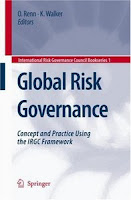 Global risks, global opportunities, global risk governance challenges.
Global risks, global opportunities, global risk governance challenges.Global risks are not confined to national borders; they cannot be managed through the actions of a single sector. The governance of global, systemic risks requires an integrative approach involving governments, intergovernmental organizations, industry, academia and civil society.
Risk accompanies change. It is a permanent and important part of life and the willingness and capacity to take and accept risk is crucial for achieving economic development and introducing new technologies. Many risks, and in particular those arising from emerging technologies, are accompanied by potential benefits and opportunities. The challenge of better risk governance lies here: to enable societies to benefit from change while minimizing the negative consequences of the associated risks.
The International Risk Governance Council (IRGC) is an independent organisation whose purpose is to help the understanding and management of emerging global risks that have impacts on human health and safety, the environment, the economy and society at large. IRGC s work includes developing concepts of risk governance, anticipating major risk issues and providing risk governance policy recommendations for key decision makers. IRGC believes that improvements in risk governance are essential if optimal risk-related decisions are to be made and to maximise trust in the processes and structures by which they are made.
This book, Global Risk Governance: Concept and Practice Using the IRGC Framework, presents IRGC s innovative risk governance framework, the careful reviews it received from internationally recognized scientists, and the results of several case studies in which the framework has been applied to a number of significant but different risks. The IRGC s framework provides a structure for how particular risks may be investigated, communicated and managed by taking into account not only scientific evidence but also risk perceptions, social concerns and societal values. It seeks to provide a comprehensive and integrated view of risk governance and, so, assist decision makers with asking the right questions and developing more effective risk governance strategies for the increasingly complex opportunities and risks we face in the world.
Download link


 Saturday, December 20, 2008
Saturday, December 20, 2008
 Unknown
Unknown

 Posted in:
Posted in:
0 comments:
Post a Comment